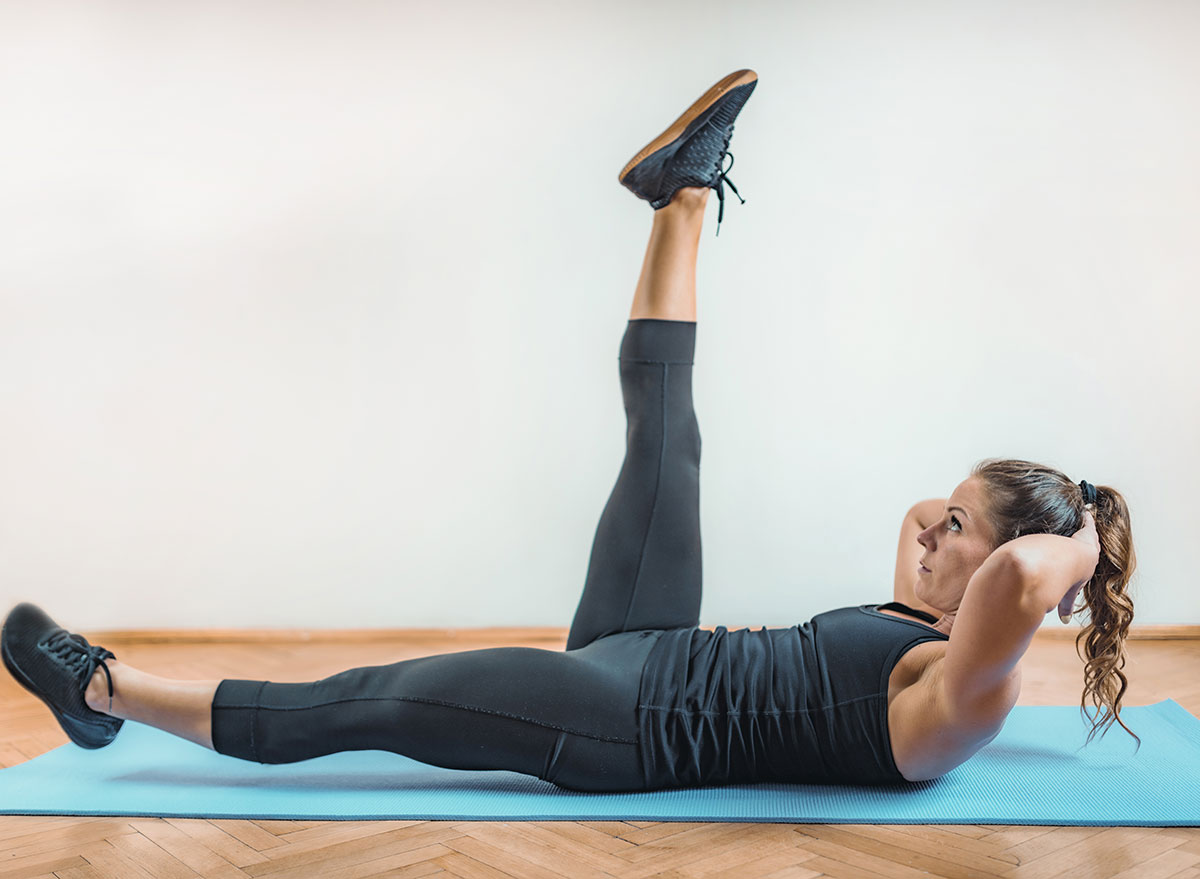This One Exercise Melts Fat Faster Than Any Other, Says Science

The workout that melts fat fastest is also one of the quickest, typically taking less than 20 minutes from start to finish. Known as high-intensity interval training or HIIT, it requires you to move fast, very fast for a very short period of time. One researcher goes as far as calling it the "one-minute workout," because one version of this training method amounts to just 60 seconds of intensely strenuous exertion, 20-second bouts broken up by periods of rest, a sequence that's repeated multiple times.
You probably recognize this exercise technique as it has been written about here and elsewhere many times. But have you tried it? And, if so, have you done it correctly and endured this rigorous style of exercising long enough to notice results?
HIIT works. A number of studies have shown that short, vigorous workouts improve markers of good health like aerobic fitness, lower blood pressure, and more stable blood sugar. Workouts like HIIT can also burn more calories and reduce more visceral fat than typical endurance exercises like walking, running, and cycling at a moderate pace will when done for an hour or more.
How so? The science is complicated; strenuous exercise triggers certain changes on the molecular level that result in what's known as excess post-exercise oxygen consumption or EPOC. In other words, after exercise, you get a metabolic after-burn for about 24 hours where you burn more calories than normal.
More important than weight loss are the aerobic fitness benefits derived from quickie exercise sessions, say researchers. In a groundbreaking study from McMaster University in Canada published in PLOS One, researchers demonstrated that just one minute of intense effort in a 10-minute workout was enough to reap the rewards. In the study, 14 sedentary overweight men and women were asked to do a 10-minute workout on stationary bicycles, pedaling as hard and fast as they could for three 20-second intervals with 2-minute rest periods of slow pedaling in between. With a warmup and cool-down, the entire workout took just 10 minutes, 60 seconds of which was intense effort. After six weeks of these 10-minute workouts done three times a week, the cyclists significantly improved their aerobic capacity by 12% on average, lowered blood pressure numbers, and enhanced other markers of aerobic and muscular fitness. (Related: Simple Ways to Keep Your Heart Healthy.)
That's good news for people who blow off exercising because they say they don't have time to fit it into their busy days. This study proves it takes just one minute of hard work in 10 minutes of your precious workout time.
And it doesn't have to be performed on a stationary bike. Martin Gibala, PhD, professor of kinesiology at McMaster, and one of the lead researchers of the study, says almost any type of exercise can be performed as sprint-style intervals. He wrote a book The One-Minute Workout: Science Shows a Way to Get Fit That's Smarter, Faster, Shorter detailing several ways to incorporate HIIT training into your busy life.
One caveat: Sprint intervals are super, super difficult. People who don't get results most often aren't pushing themselves hard enough, trainers say. It's physically and psychologically challenging. You have to be OK with feeling discomfort.
"I tell people to imagine a bloodthirsty Rottweiler is chasing them and trying to take a bite out of their hamstring – run like your life depends on it," says Denver-based personal trainer and fitness writer Eric C. Stevens. He makes another critical point: "To stay motivated at that level of exertion choose an exercise that you love doing. For me that's boxing and martial arts because of the skill set required and the sense of community." (Related: 10 Easy Ways to Burn Fat in 30 Minutes)
But it can be any activity—rowing classes, cycling, brisk walking, even resistance training—any activity where you can push yourself to near exhaustion for short bouts.
Stevens suggests two basic types of sprint intervals to try if you want to sample this super-fast way to get fit. But first, a critical step to avoid injury: Begin each HIIT workout with a total-body dynamic warm-up for three to five minutes, he says. Do arm circles while marching in place, jumping jacks, jump rope, inchworms, anything that gets all your limbs involved and raises your heart rate.
30, 20, 10

Use a stopwatch or clock with a second hand to keep time. After your warm-up, begin running, cycling, or rowing for 30 seconds at a light intensity. Next, do 20 seconds at a high intensity where you find it difficult to talk in complete sentences. Without resting, go right into a 10-second segment of maximum "rottweiler-in-pursuit" effort. You'll know you're pushing hard enough if you're too winded to speak. Repeat the 30-20-10 sequence four more times, followed by a three-minute cooldown of walking and stretching.
Tabata

Always begin with a dynamic warmup for three to five minutes. Tabata training follows a 20-10 sequence. You begin with 20-seconds of high-intensity, all-out effort, followed by 10 seconds of rest (very slow pedaling or walking). Repeat the pattern seven more times for a total of four minutes. End with a cooldown.
"You can play with those interval times as long as you are getting the intensity," says Stevens. "Anerobic training takes a monstrous effort. It also feels terrible at times. But if you want the body of a dancer, a gymnast or sprinter, you have to train like one."
Since HIIT is so physically taxing, be sure that you are healthy enough before trying this exercise strategy. Visit your physician for a full physical exam.
Also, note that trainers like Stevens and researchers like Gibala stress that the most effective and efficient way to lose weight and maintain the weight loss is not through exercise but by reducing calories through a healthy diet. If sucking wind isn't for you, you may be interested in Lazy Ways to Lose Weight All Year Long.
For more healthy eating news, make sure to sign up for our newsletter!






